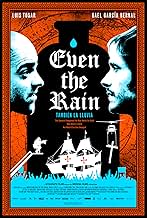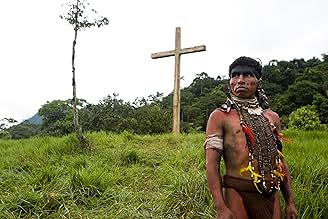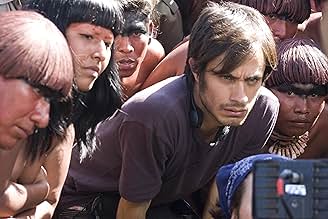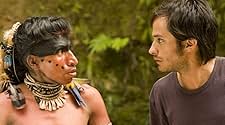ÉVALUATION IMDb
7,4/10
14 k
MA NOTE
Alors qu'un réalisateur et son équipe tournent un film controversé sur Christophe Colomb à Cochabamba en Bolivie, la population locale s'oppose aux projets de privatisation de l'approvisionn... Tout lireAlors qu'un réalisateur et son équipe tournent un film controversé sur Christophe Colomb à Cochabamba en Bolivie, la population locale s'oppose aux projets de privatisation de l'approvisionnement en eau.Alors qu'un réalisateur et son équipe tournent un film controversé sur Christophe Colomb à Cochabamba en Bolivie, la population locale s'oppose aux projets de privatisation de l'approvisionnement en eau.
- Prix
- 22 victoires et 17 nominations au total
Histoire
Le saviez-vous
- AnecdotesThe scene where the little girl sees herself on screen was kind of a self homage by director/actress Icíar Bollaín. She wanted to transmit her first impression when she saw herself on screen being a teenager.
- ConnexionsFeatured in Ebert Presents: At the Movies: Episode #1.6 (2011)
Commentaire en vedette
EVEN THE RAIN (También la lluvia) is a brilliant metaphor of a story written by Paul Laverty based on an actual event and directed with considerable skill by Icíar Bollaín, the great Spanish actress, writer and director. This film is one of those rare 'docudramas' that bring to light historical 'secrets' that beg to be shared. In 2000 an American water company bought the water supply from the Bolivian government and the citizens of Bolivia were banned from collecting rainwater which had become corporate property. This resulted in a violent protest against the government by the indigenous Indians and the citizenry of Cochambamba, Bolivia who claimed their rights to the natural gifts of nature - even the rain. Laverty and Bollaín expose this injustice through a well-conceived story within a story.
Spanish film director Sebastián (Gael García Bernal), his cynical producer Costa (Luis Tosar), and crew including Antón (Karra Elejalde) have come to Cochabamba, Bolivia to shoot their film about Christopher Columbus (played by actor Antón - Karra Elejalde) and his first explorations, revealing the way the Spaniards treated the native Indians: Costa has chosen the place because he can get cheap labor in using local actors and extras to keep within the small budget of the film. Sebastián is the compassionate one who wants the Indians treated well, hiring a mouthy young Indian named Hatuey/Daniel (Juan Carlos Aduviri) when he claims he and his family are being unjustly overlooked as actor candidates. The filming goes well, with the exception of some minor glitches for particular scenes the Indians find too dangerous, until a conflict develops over the governmental privatization of the water supply. Daniel becomes an activist against the government who plan a 300% increase in price of water - the average daily income for the Indians is $2. a day! - and the conditions in the city become unfriendly for the film to continue. Bloody violence and chaos breakout and many citizens are being killed or jailed. It is at this point that the caring Sebastián finally decides that he and his crew must flee, and with some role reversal, Costa stays behind to protect Daniel's family.
According to Bollaín, 'It was the gold 500 years ago, and now it's the water, which is the gold of the 21st century. Before it was the Crown of Spain and the pope who approved the conquest. Now it is the new theologians, the IMF and the World Bank. Again it's the word from above, saying, 'This is right.' The Spanish filmmakers in the film-within-a-film are caught in the middle. They have the attitude of neo-conquerors - they go there because it's cheap. But they're also trying to make a film that casts a different look on the conquest. And it's an adventure.'
Iciar Bollaín directs this epic film with great dignity and with a keen observation of how history, even inadvertently, repeats itself. The cinematography by Alex Catalán and the musical score by Alberto Iglesias add immeasurably to the film's success. The cast of extras is exceptional and very well directed. Both Gael García Bernal and Luis Tosar deliver intensely considered performances as does Juan Carlos Aduviri as the key central figure Daniel. Hopefully this film, nominated for Best Foreign Film in the 2010 Academy Awards. In Spanish with English subtitles.
Grady Harp
Spanish film director Sebastián (Gael García Bernal), his cynical producer Costa (Luis Tosar), and crew including Antón (Karra Elejalde) have come to Cochabamba, Bolivia to shoot their film about Christopher Columbus (played by actor Antón - Karra Elejalde) and his first explorations, revealing the way the Spaniards treated the native Indians: Costa has chosen the place because he can get cheap labor in using local actors and extras to keep within the small budget of the film. Sebastián is the compassionate one who wants the Indians treated well, hiring a mouthy young Indian named Hatuey/Daniel (Juan Carlos Aduviri) when he claims he and his family are being unjustly overlooked as actor candidates. The filming goes well, with the exception of some minor glitches for particular scenes the Indians find too dangerous, until a conflict develops over the governmental privatization of the water supply. Daniel becomes an activist against the government who plan a 300% increase in price of water - the average daily income for the Indians is $2. a day! - and the conditions in the city become unfriendly for the film to continue. Bloody violence and chaos breakout and many citizens are being killed or jailed. It is at this point that the caring Sebastián finally decides that he and his crew must flee, and with some role reversal, Costa stays behind to protect Daniel's family.
According to Bollaín, 'It was the gold 500 years ago, and now it's the water, which is the gold of the 21st century. Before it was the Crown of Spain and the pope who approved the conquest. Now it is the new theologians, the IMF and the World Bank. Again it's the word from above, saying, 'This is right.' The Spanish filmmakers in the film-within-a-film are caught in the middle. They have the attitude of neo-conquerors - they go there because it's cheap. But they're also trying to make a film that casts a different look on the conquest. And it's an adventure.'
Iciar Bollaín directs this epic film with great dignity and with a keen observation of how history, even inadvertently, repeats itself. The cinematography by Alex Catalán and the musical score by Alberto Iglesias add immeasurably to the film's success. The cast of extras is exceptional and very well directed. Both Gael García Bernal and Luis Tosar deliver intensely considered performances as does Juan Carlos Aduviri as the key central figure Daniel. Hopefully this film, nominated for Best Foreign Film in the 2010 Academy Awards. In Spanish with English subtitles.
Grady Harp
- gradyharp
- 18 mai 2011
- Lien permanent
Meilleurs choix
Connectez-vous pour évaluer et surveiller les recommandations personnalisées
- How long is Even the Rain?Propulsé par Alexa
Détails
Box-office
- Brut – États-Unis et Canada
- 518 017 $ US
- Fin de semaine d'ouverture – États-Unis et Canada
- 53 730 $ US
- 20 févr. 2011
- Brut – à l'échelle mondiale
- 7 313 485 $ US
- Durée1 heure 43 minutes
- Couleur
- Mixage
- Rapport de forme
- 2.35 : 1
Contribuer à cette page
Suggérer une modification ou ajouter du contenu manquant

Lacune principale
By what name was También la lluvia (2010) officially released in India in English?
Répondre




























